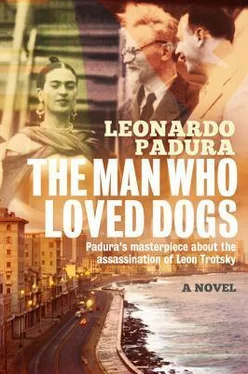As they headed toward Odessa, the former commissar of war had time to make a new account of the actions, convictions, and greater and lesser mistakes of his life, and he thought that, even though they had forced him to turn into a pariah, he did not regret what he had done and felt ready to pay the price for his actions and dreams. He was even more firm in those convictions when the train passed through Odessa and he recalled those years that now seemed tremendously remote, when he had entered the city’s university and understood that his future lay not in mathematics but rather in the struggle against a tyrannical system; thus had begun his endless career as a revolutionary. In Odessa he had introduced the recently founded South Russian Workers’ Union to other clandestine groups, without having a clear idea of their political influence; there he had suffered his first imprisonment, had read Darwin and banished from his young Jewish man’s mind, already too heterodox, the idea of the existence of any supreme being; there he had been judged and sentenced for the first time, and the punishment had also been exile. That time the Czarist henchmen had sent him to Siberia for four years, while now his former comrades in arms were deporting him outside of his own country, perhaps for the rest of his days. And there, in Odessa, he met the affable jailer who supplied him with paper and ink. This was the man whose resounding name he had chosen when, having fled Siberia, some comrades gave him a blank passport so that he could embark on his first exile and, in the space reserved for the name, Trotsky wrote the jailer’s last name, which had accompanied him ever since.
After going around the city by the coast, the train stopped at a branch line that went all the way to the port’s quays. The spectacle that unfolded before the travelers was moving: through the blizzard beating at the windows, they contemplated the extraordinary panorama of the frozen bay, the ships planted in the ice, their spars broken.
Bulanov and some other Cheka agents left the train and boarded a steamship called the Kalinin , while other agents introduced themselves in the car to announce that Sergei Sedov and Anya should leave, since the deportees would soon be embarking. The farewell, at the end of so many days of cohabitation within the walls of the train car, was more devastating than they had imagined. Natalia cried while caressing the face of her little Seriozha, and Liova and Anya hugged as if wanting to transmit through their skin the feeling of abandonment into which they were being thrown by that separation without any foreseeable end. To protect himself, he bid farewell briefly, but as he looked into Seriozha’s eyes, he had the premonition that it was the last time he would see that young man, so healthy and handsome, who had enough intelligence to spurn politics. He hugged him strongly and kissed him on the lips, to take with him some of his warmth and being. Then he withdrew to a corner, followed by Maya, and struggled to drive out of his mind the words Piatakov said to him, at the end of that dismal Central Committee meeting in 1926, when Stalin, with Bukharin’s support, had achieved his expulsion from the Politburo and Lev Davidovich would accuse him in front of the comrades of having turned into the Grave Digger of the Revolution. As he was leaving, the redheaded Piatakov had said to him, with that habit of his of speaking into one’s ear, “Why? Why have you done it?. . He will never forgive you this offense. He will make you pay for it until the third or fourth generation.” He asked himself: Was it possible that Stalin’s political hate would end up extending to these children who represented not just the best of the revolution but of his life? Would his cruelty one day reach Seriozha who had taught the young Svetlana Stalina how to read and count? And he had to answer himself that hate is an unstoppable illness as he stroked his dog’s head and observed for the last time — he felt it deep down inside — the city where thirty years before he had wed himself to the revolution forever.
“Yes, tell him yes.”
For the rest of his days, Ramón Mercader would remember that, just a few seconds before pronouncing the words destined to change his life, he had discovered the unhealthy density that accompanies silence in the middle of war. For weeks he had lived amid the din of the bombs, the shots and the engines, the shouted orders and the cries of pain, and it all accumulated in his consciousness like the sounds of life; the sudden leaden fall of that heavy silence, capable of causing a helplessness too much like fear, turned into a troubling presence when he understood that, after that precarious silence, the explosion of death could suddenly take him away.
In the years of imprisonment, of doubts and alienation, to which those four words would lead him, many times Ramón persisted in challenging himself to imagine what would have happened with his life had he said no. He would insist on re-creating a parallel existence, an essentially novelistic journey in which he had never ceased to be called Ramón, to be Ramón, to act like Ramón, perhaps far from his country and his memories, like so many men of his generation, but always being Ramón Mercader del Río in body and, above all, in soul.
Caridad had arrived a few hours before, in the company of little Luis. They had traveled from Barcelona, through Valencia, driving the powerful Ford that was confiscated from some executed aristocrats and which the Catalan communist leaders usually used to get around. The safe conducts, adorned with signatures capable of opening all Republican military controls, had allowed them to reach the side of that rugged mountain of the Sierra de Guadarrama. The temperature, several degrees below zero, had forced them to stay inside the car, covered with blankets and breathing in air polluted by Caridad’s cigarettes, which took Luis to the edge of nausea. When Ramón was at last able to make it down to the safety of the mountainside, bothered by what he considered to be one of his mother’s many customary interferences in his life, his brother Luis was sleeping in the backseat and Caridad, a cigarette in hand, was pacing around the car, kicking rocks and cursing the cold that made her exhale condensed clouds. As soon as she noticed him, the woman enveloped him with her green stare, colder than a night in the sierra, and Ramón remembered that ever since the day they had met again, over a year ago already, his mother had not given him one of those wet kisses that, when he was a child, she used to deposit at the corner of his mouth so that the sweet taste of saliva, with its lingering taste of aniseed, would drip down his taste buds and cause the overwhelming need to keep it in his mouth for longer than the process of his own secretions would allow.
They had not seen each other for several months, ever since Caridad, convalescing from the wounds she received in Albacete, was commissioned by the party to travel to Mexico to gather material support and moral solidarity for the Republican cause. In that time, the woman had changed. It wasn’t that the movement of her left arm was still limited by the lacerations caused by shelling; nor was it because of the recent news of the death of her son Pablo, an adolescent who she herself had forced to go to the front in Madrid, where he’d been crushed by the crawler tracks of an Italian tank. Ramón attributed it to something more visceral that he would discover that night.
“I’ve been waiting for you for six hours. The sun is about to come out and I can’t go much longer without some coffee” was how the woman greeted him, focused on crushing a cigarette under her military boot as she looked at the small, shaggy dog accompanying Ramón.
Cannons roared in the distance and the sound of fighter plane engines was an all-encompassing rumble that descended from the starless sky. Would it snow? Ramón wondered.
Читать дальше











